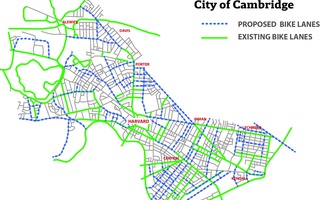A billboard in front of Cambridge City Hall asks: How would you spend $500,000 to improve the city?
From March 22 to 28, Cambridge residents 12 and up will be able to vote on projects proposed by residents for city improvements. For its first participatory budget, the city will set aside $500,000 to fund one-time capital projects chosen from a pool of 20, which was whittled down from an original list of 380.
Potential projects include bike repair stations ($12,000), a Cambridge Garden of Peace ($340,000) and free wifi in six outdoor spaces ($42,000). Others ideas would create murals, amphitheatres, and even a dog park.
A “Toilet for All” ($320,000) could be installed in Central Square.
Voters can cast ballots in person or by phone. According to Michelle Monsegur, who works in the Cambridge Budget Department, Harvard students are able to vote. So long as they live in Cambridge, they do not need to be from the area to vote, nor do they need to have a 617 area code. To vote online, all one needs is a phone that can receive texts.
“You don’t have to do the math, you don't have to rank them, you just have to pick your five favorites,” Monsegur said. “If you're going to be a part of this community for four years, why not voice [your] opinion about what you’d like to see in this town?”
While this is Cambridge’s first participatory budget, the Participatory Budget Project began in Brazil in 1989, and its programs have been implemented in 1,500 city budgets worldwide. The program aims to engage citizens in government; this is the first year it has come to Cambridge, which has seen 700 to 800 votes cast so far, according to Pam Jennings, who works with the Project.
At a project Expo in Windsor Street Health Center, dozens of Cambridge residents, many of them parents with children, toured a warmly lit room full of poster boards that explained the various proposals. Some featured origami; others, cut-out letters. All were colorful. Laptops in the corner of the room were available for voting, and volunteers roamed throughout the room to answer questions.
Kathy L. Watkins, who lives in West Cambridge, had a proposal that made the final cut. The proposal, Little Free Libraries (Book Exchanges) ($13,000), would place around the city 13 small waterproof containers, in which residents would be able to take and leave free books. Watkins was hopeful her project would be voted in, but said she was enthusiastic about all the projects that had been suggested.
“I’ve always wanted them to do [the Participatory Budget] here,” she said. “Sometimes I feel like I talk and talk and no one listens, this is a process that really brings the community together.”
The results will be announced in April, and winning projects will be implemented July and onwards. Currently, according to Monsegur, a more popular project has been Healthy Trees for a Healthy Cambridge! ($119,400).
“Word’s starting to spread pretty quickly,” Monsegur said. “What’s exciting people is that you have to be 12 to vote ... maybe that will encourage [the minors] as they grow older to vote in other elections. I think that’s exciting.”
—Staff writer Samuel E. Liu can be reached at samuel.liu@thecrimson.com. Follow him on Twitter @samuelliu96.
Read more in News
Undergrads Stress Public Service and Accessibility at Faust ForumRecommended Articles
-
Two HKS Students Call for Greater Civic EngagmentTwo Kennedy School of Government students advocated for more innovations aimed at engaging the public in local politics and shared their experiences working at the municipal level Friday afternoon.
-
 After Fatal Crashes, Cantabrigians Debate Bike Lanes
After Fatal Crashes, Cantabrigians Debate Bike Lanes -
 Samuel Gebru
Samuel Gebru -
 Vatsady Sivongxay
Vatsady Sivongxay -
 Cambridge Allocates $867,000 to Seven Participatory Budget Projects
Cambridge Allocates $867,000 to Seven Participatory Budget Projects













